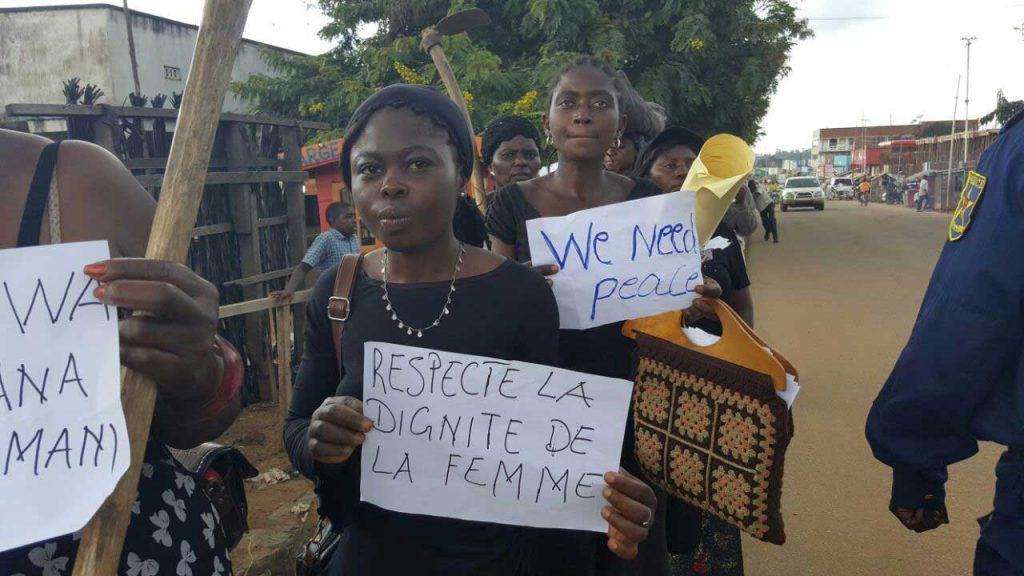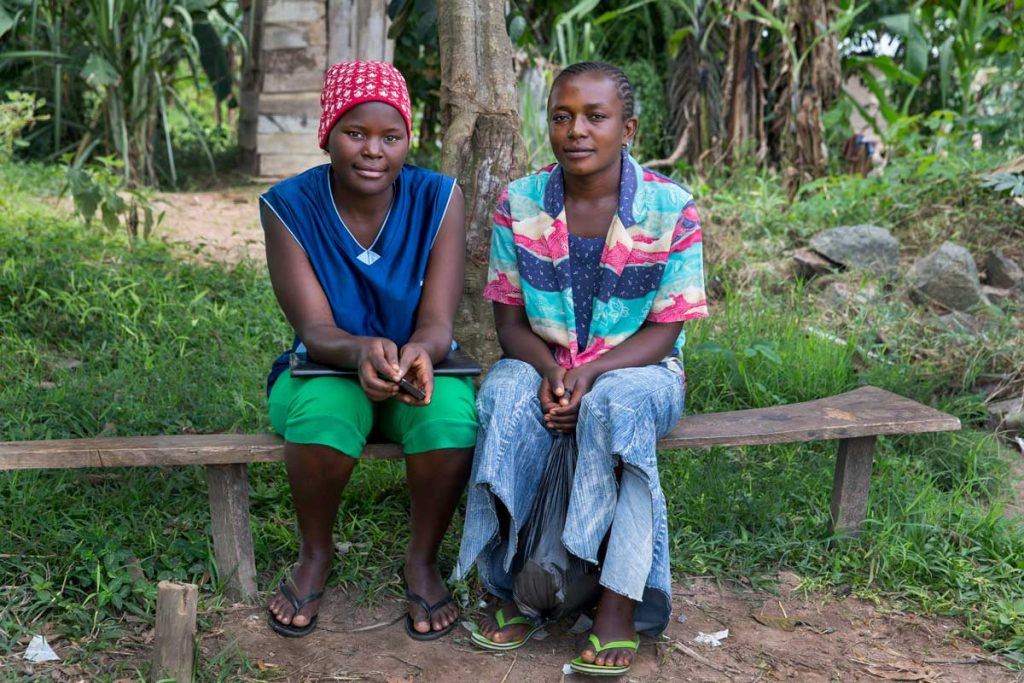Women’s rights activists are enraged that a popular African rumba musician has spent recent weeks posting music videos to the web and playing gigs in his native Democratic Republic of Congo—despite the fact that earlier in the summer, a cell phone camera captured him allegedly assaulting one of his dancers.
The singer, Koffi Olomide, was arrested in Kenya after the late July incident and then deported back to the DRC, where he was charged with assault and battery and sentenced to several months in prison, according to news reports. Kenya and Zambia canceled scheduled concerts, but Olomide returned to performing in the DRC immediately after a “secret” release from a few days of detention.
This is not the first offense for the award-winning musician—known for a slow style of soukous, a type of rumba. Since the ‘90s, he has been accused of a variety of crimes, including destroying the passports of a dancer and a singer, attempting to rape several dancers, assaulting a producer and kicking a cameraman. He is reportedly banned from performing in many European cities because of unresolved cases and political opposition. That he was released with only a proverbial slap on the wrist despite this track record is, to many Congolese women, just more evidence that their country treats violence against women lightly.

Rights Groups Decry an Insufficient Sentence
After observing events unfold this summer, a handful of women’s rights organizations supported by AJWS in the DRC expressed disappointment and outrage, calling for a tougher punishment for Olomide and recommitting themselves to advocating for greater reforms to the Congolese justice system. They say a high-profile case like this one could spell change in how everyday instances of violence against women in the country are treated by society and prioritized in the courts.
“This is an insult against the dignity and status of all Congolese girls and women,” said Zawadi Sylvie Malala, a member of Youth Action on Human Rights (YAHRI), which works with young girls and single mothers who have survived rape and sexual assault in an eastern province of DRC. “This is the real expression of a dysfunctional justice system characterized by corruption, impunity and the trading of influence. [The women we work with who have survived sexual violence] feel anger to see the system siding with the strongest, even when he is wrong—and shame because this case highlights the situation that some girls living in remote areas go through.
“Survivors think we must continue to advocate, especially with authorities, [and] take this issue all the way up to the president of the country so to demand an exemplary sanction against Koffi Olomide and other perpetrators of similar cases,” she continued. “Survivors think there is still a long way to go in the fight against sexual violence and gender-based violence.”
Zawadi said YAHRI has had success in raising awareness about gender inequality in the community and in educating and empowering girls to stand up and insist that they should not have to accept violence as a reality of life.
Adding Fuel to Their Fire
Other groups have also made headway against the culture of violence: Action des Femmes pour les Droits et Developpement, another organization supported by AJWS in the DRC, has taught hundreds of people about women’s equality and the importance of stopping violence by building relationships with local town chiefs, and spreading its message over the airways on radio talk shows and via community theater. And thanks to its efforts to empower women to seek out leadership roles, local villages have appointed 59 women to village leadership positions traditionally held by men.
Another group, Congo Men’s Network (COMEN), has established 51 men’s groups to teach men to respect women and speak out when a women is abused.
Although these organizations are seeing results, they are waging an up-hill battle trying to change an entrenched machismo culture. YAHRI reports that it is not uncommon to see supervisors verbally abuse female employees in public—calling them “lazy” or telling them their “place is in the kitchen” or they’re “only good at making children.” Teachers and principals also regularly physically or sexually abuse female students, which causes many girls to drop out of school.

Other organizations in the region report workplace harassment—including police harassing women and girls in marketplaces and destroying their goods; and some male employers sexually assaulting or beating the domestic workers or babysitters who work in their households. Girls and women have reported being beaten in nightclubs and cabarets by police officers.
Ilot Muthaka Alphonse, coordinator of COMEN, said that “for us, it is important to work hard on [combatting] oppressive masculinities. For many men and boys, hitting a girl or woman is not a problem. I think that Koffi Olomide did not even regret what he did.” Cases like this, Ilot continued, “reinforce the trauma [survivors of violence] are already suffering. When a celebrity or a highly-placed authority is a perpetrator, it pushes women to flee their environments in order to live elsewhere—either in an [internally-displaced persons] camp or a foreign country.”
COMEN is gathering information to start a petition demanding a fair trial so the survivor can have a chance at justice. Ilot noted that music plays a crucial role in DRC, so holding a musician accountable for his alleged offenses would send a strong message to society that violence against women shouldn’t be tolerated. “To not punish Mr. Olomide means strengthening the idea that beating a woman is only a ‘corrective measure,’ as many men and boys in our community put it,” he said. “We hear [some of] his fans saying that people like Olomide should not stay in jail long for such a ‘small matter.’ When people treat this issue as ‘a small matter,’ then it is normal to see [violence against women] classified in the ‘small issue’ section.”
A Song That Mimics an Apology Gift
Even though Olomide initially denied kicking his dancer—claiming he was trying to defend the troupe from pickpocketers—he has since staged free concerts in DRC in what analysts describe as attempts to apologize to fans and women for his actions. On August 15th, he shared on Facebook a song “dedicated to women” called “Maman Pardon” or “Mom, Sorry.”
When AJWS’s partners heard the “apology” tune, they felt further disappointed—convinced that the song was disingenuous and insufficient.
“It’s not enough, because I’m afraid that he will repeat this [behavior] in the future,” Ilot said. “For me, he sang this song to clean up his image, especially because women constitute the majority of his fans. So far, I am not convinced that he has any regrets.”
Julienne Baseke, coordinator of Association of Women in Media (AFEM), also compared the song to an admission of guilt. “A song is not going to relieve women or repair the harms they suffer,” she said. “A sanction is rather needed to humanize and to get people to respect women. Some people even think the song is a ‘flattery’ to distract or manipulate women so as to prevent them from standing in solidarity with the survivor and to divert attention from the principle of zero tolerance for gender-based violence…Forgiveness is not justice.”
Claudine Tsongo of Dynamique des Femmes Juristes (DJF), which provides free legal aid and representation to women and girls in need, saw utility in the public nature of this apology:
“When Olomide was deported from Kenya, he did not expect that his fans in the DRC would be outraged to the point of protesting on social media and making public statements of outrage,” she said. “Worse, he did not think he could be humiliated by his arrest and detention. So he is trying to find ways to redeem himself. In some respects, this move is a good idea, in the sense that Koffi [may] realize every woman counts as a human being with human rights that cannot be violated.”
But, Claudine continued, the apology is a typical form of redress used by abusive men to “coax women after committing serious violence. It’s a song in this case, but other men also do fanciful poems, wishful words, superficial declarations of love, and small deceptive gifts like jewelry, super wax wraps, cans of local drinks and goats. And composing a song for Koffi is his everyday life. This does not cost him almost anything. He will not stop abusing his female dancers if composing a new song for her is enough to be forgiven.”
Real Consequences Are Needed
Claudine and others say that survivors would rather see Olmide do time in jail, but they doubt it will ever happen.
“Most survivors of violence know that a rich person like Koffi cannot undergo the rigor of the law in the DRC for intentional injury,” Claudine said. “He is not afraid of the Congolese justice system because he knows how to go around it. And the poor dancer may be a double victim” because she can’t afford legal representation to obtain compensation, she added.
Undeterred by the weak rule of law, Congolese activists are taking action to seek punishment for Olomide. Mambo of Solidarité Féminine pour la Paix et Développement (SOFEPADI) called for Radio Okapi, a popular radio station co-created by the United Nations Mission in the country, to boycott Olomide’s songs. She also suggested diplomatic institutions deny Olomide a visa. “We believe that the combined efforts of national and international actors could discourage this kind of behavior. The initiatives taken by Congolese women should be supported even by the international community to put pressure on our government.”
L’Union Congolaise des Femmes des Médias (UCOFEM) encourages women and girls to follow in the footsteps of the person who caught Olomide’s attack on camera and publicized it to the world. Anna Mayimona Ngemba, director of UCOFEM, said that if the Olomide incident hadn’t occurred in public and on camera, it may not have been publicized. “Many other people act like this and it goes unnoticed,” she said.
Zawadi from YAHRI added: “It is crucial to increase awareness-raising campaigns and education at all levels to help survivors break the silence and overcome fear,” she said. “We must publicize all the ills that plague the justice system. We must not close our eyes and mouths when confronted with its dysfunctions until the authorities change their positions and manners. And we must support [each others’] actions because it is easy to undermine or dismiss the rights and demands of one person, but not when we have a group united around a common cause.”
AJWS’s work in countries and communities changes over time, responding to the evolving needs of partner organizations and the people they serve. To learn where AJWS is supporting activists and social justice movements today, please see Where We Work.

